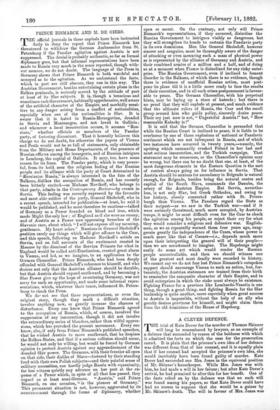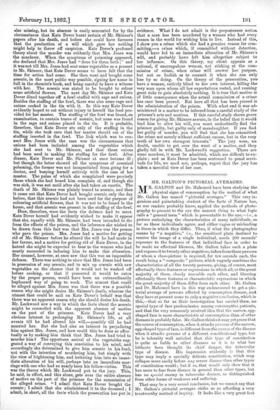A CLEVER DEFENCE. also missing, but its absence is easily
accounted for by the circumstance that Kate Dover burnt certain of Mr. Skinner's papers after his death, and before she could have foreseen that the production of a will which gave her nothing might help to throw off suspicion. Kate Dover's professed theory about the murder was evidently that Mrs. Jones was the murderer. When the symptoms of poisoning appeared, she declared that Mrs. Jones had " done for them both ; ' and it was not till Mrs. Jones had sent some vegetables as a present to Mr. Skinner, that Kate Dover seems to have felt that the time for action had come. She then went and bought some arsenic, in the most public way possible, signing her name in full in the chemist's book, and being careful to have a witness with her. The arsenic was stated to be bought to colour some artificial flowers. The next day Mr. Skinner and Kate Dover dined together off a fowl stuffed with sage and onions. Besides the stuffing of the fowl, there was also some sage and onions cooked in the tin with it. In this way Kate Dover evidently hoped to eat without injury to herself the food pro- vided for her master. The stuffing of the fowl was found, on examination, to contain traces of arsenic, but none was found in the sage and onions placed in the lin. It is probable, therefore, that Kate Dover ate only of the stuffing in the tin, while she took care that her master should eat of the stuffing inserted in the fowl. The link which was to con- nect Mrs. Jones with the case was the circumstance that onions had been included among the vegetables which she had sent to Mr. Skinner, and that these. onions had been used in making the stuffing for the fowl. After dinner, Kate Dover and Mr. Skinner at once became ill ; but though the latter showed all the symptoms of arsenical poisoning, the former was not incapacitated from going for a doctor, and busying herself actively with the case of her master. The pains of which she complained were precisely those which she had heard him complain of, and though she was sick, it was not until after she had taken an emetic. The death of Mr. Skinner was plainly traced to arsenic, and then it came out that Kate Dover had bought arsenic only the day before, that this arsenic had not been used for the purpose of colouring artificial flowers, that it was not to be found in the house, and that arsenic was present in the stuffing of the fowl. Here, therefore, were the facts the defence had to meet. Kate Dover herself had evidently wished to make it appear that she, equally with Mr. Skinner, had been intended to die from the effects of the poison, and the inference she wished to be drawn from this fact was that Mrs. Jones was the person who gave the poison. Mrs. Jones had a motive for getting rid of Mr. Skinner before he altered the will he had made in her favour, and a motive for getting rid of Kate Dover, in the hatred she might be expected to bear to the woman who had nearly succeeded in inducing him to make this alteration. Her counsel, however, at once saw that this was an impossible defence. There was nothing to show that Mrs. Jones had been in possession of any arsenic, and to mix up arsenic with raw vegetables on the chance that it would not be washed off before cooking, or that if preserved it would be eaten by the proper person, would have been an extraordinarily haphazard way of going to work. The utmost that could be alleged against Mrs. Jones was that there was a possible reason why she might desire Mr. Skinner's death, whereas the utmost that could be said on Kate Dover's behalf was that there was no apparent reason why she should desire his death. Mr. Lockwood saw a way in which the facts about the arsenic might be reconciled with the apparent absence of motive on the part of the prisoner. Kate Dover had a very obvious interest in prolonging Mr. Skinner's life, at all events till he had altered his will,—possibly till he had married her. But she had also an interest in prejudicing him against Mrs. Jones, and how could this be done so effec- tually as by making him think that Mrs. Jones had tried to murder him ? The opportune arrival of the vegetables sug- gested a way of conveying this conviction to his mind, and accordingly she determined to give him arsenic in his food, not with the intention of murdering him, but simply with the view of frightening him, and irritating him into an imme- diate alteration of his will, perhaps into an immediate mar- riage with one who had so nearly been his fellow-victim. This was the theory which Mr. Lockwood put to the jury. This, he said, in effect, and this alone, gets over the entire absence of motive on the part of the prisoner for the commission of the alleged crime. " I admit that Kate Dover bought the arsenic ; I admit that she administered it to the deceased • I admit, in short, all the facts which the prosecution has put in evidence. What I do not admit is the preposterous notion that a man has been murdered by a woman who had every reason in the world for wishing him to live. Instead of this, I show you a crime which she had a genuine reason for corn- mitting,—a crime which, if committed without detection, would have led to an immediate alteration of Mr. Skinner's will, and probably have left him altogether subject to her influence. On this theory, my client appears as a rational, if unscrupulous woman, not sticking at the com- mission of crime, when crime will answer her purpose, but not so foolish as to commit it when she can only lose by so doing. On the theory of the prosecution, yea have a woman, entirely blind to her own interest, killing the very man upon whom all her expectations rested, and running great risks to gain absolutely nothing. It is true that motive is of little consequence when the actual commission of a crime has once been proved. But here all that has been proved is- the administration of the poison. With what end it was ad- ministered is a matter to be inferred from a careful study of the prisoner's acts and motives. If this careful study shows grave reason for giving Mr. Skinner arsenic, in the belief that it would. lead him to alter his will, you must undoubtedly find the prisoner guilty, but guilty only of manslaughter. If you find her guilty of murder, you will find that she has committed the crime not merely without sufficient excuse, but in the very teeth of her own strongest interests." The jury were, no
doubt, unable to get over the want of a motive, and they fell in with Mr. Lockwood's suggestion. There are some murders, it must be admitted, which are difficult to ex- plain ; and as Kate Dover has been sentenced to penal servi- tude for life, we need not, perhaps, regret that the jury has taken a merciful view of her case.















































 Previous page
Previous page